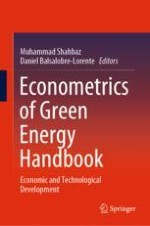2020 | OriginalPaper | Chapter
14. How Does Environmental Degradation React to Stock Market Development in Developing Countries?
Authors : Mert Topcu, Can Tansel Tugcu, Oguz Ocal
Published in: Econometrics of Green Energy Handbook
Publisher: Springer International Publishing
Activate our intelligent search to find suitable subject content or patents.
Select sections of text to find matching patents with Artificial Intelligence. powered by
Select sections of text to find additional relevant content using AI-assisted search. powered by
